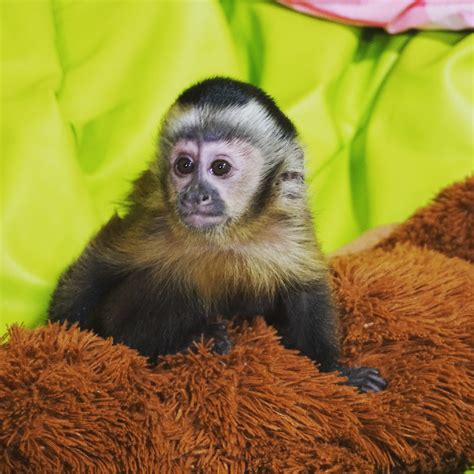Capuchin monkeys, known for their intelligence and playful nature, have become increasingly popular as exotic pets. Their curious and affectionate personalities make them a joy to own, but it’s essential to fully understand their needs and responsibilities before bringing one into your home. This comprehensive guide will provide all the information you need to make an informed decision about capuchin monkeys for sale.

Why Choose a Capuchin Monkey?
Capuchin monkeys offer several unique advantages as pets:
- Intelligence: They rank among the most intelligent primates, making them capable of learning tricks, solving puzzles, and even using tools.
- Affectionate: Capuchins are highly social creatures that crave attention and form strong bonds with their owners.
- Playful: Their playful nature makes them entertaining companions, engaging in various activities such as climbing, swinging, and exploring.
- Omnivorous Diet: Capuchins have an omnivorous diet, making it easy to provide them with a balanced and nutritious meal plan.
Considerations Before Buying
While capuchin monkeys can be rewarding pets, there are also significant factors to consider before purchasing one:
- Space Requirements: Capuchins require a spacious enclosure with plenty of room to climb, explore, and exercise.
- Time Commitment: These monkeys are highly social and require daily interaction and attention from their owners.
- Training and Enrichment: They need ongoing training and mental stimulation to prevent boredom and destructive behavior.
- Long Lifespan: Capuchins can live for 20 to 30 years, making it a long-term commitment.
- Medical Care: They require regular veterinary care, including vaccinations, dental checkups, and species-specific medical attention.
Legal Requirements and Permits
The legality of owning capuchin monkeys varies widely by country and state. In some places, they are illegal to keep as pets, while others require permits and specific housing standards. It’s crucial to thoroughly research and ensure you comply with all local regulations before purchasing a capuchin monkey.
Finding a Reputable Breeder
Choosing a reputable breeder is essential to ensure the well-being of your capuchin monkey. Look for breeders who:
- Have a proven track record and positive customer reviews.
- Prioritize ethical breeding practices and animal welfare.
- Provide comprehensive information about the monkey’s health, diet, and behavior.
- Offer ongoing support and resources to owners.
Cost of Ownership
The cost associated with owning a capuchin monkey is substantial and includes:
- Initial Purchase: The price of a capuchin monkey can range from $5,000 to $15,000, depending on factors such as age, breed, and availability.
- Enclosure: A spacious enclosure can cost between $1,000 and $5,000, depending on size and materials used.
- Diet: A balanced diet for a capuchin monkey can cost around $100 to $200 per month.
- Veterinary Care: Routine veterinary care, vaccines, and potential medical emergencies can add up to significant expenses.
- Insurance: Capuchin monkey insurance can provide peace of mind and cover unexpected veterinary costs.
Health and Care
Capuchin monkeys are susceptible to various health conditions, including:
- Nutritional Deficiencies: A balanced diet is crucial to prevent malnutrition and related health issues.
- Dental Disease: Capuchins are prone to dental problems, requiring regular dental checkups and cleanings.
- Infectious Diseases: Some infectious diseases, such as respiratory infections and parasites, can affect capuchin monkeys.
- Psychological Issues: Boredom or lack of stimulation can lead to behavioral problems such as self-mutilation or aggression.
Capuchin Monkey Training
Training a capuchin monkey requires patience, consistency, and positive reinforcement. Focus on:
- Basic Commands: Teach essential commands such as sit, stay, come, and leave it.
- Potty Training: Train your capuchin monkey to use a designated area for waste elimination.
- Behavioral Management: Address undesirable behaviors, such as biting or scratching, through appropriate training techniques.
- Enrichment Activities: Provide stimulating and enriching activities, such as puzzle feeders, interactive toys, and training.
Applications of Capuchin Monkey Research
Capuchin monkeys have played a significant role in scientific research, particularly in:
- Neuroscience: Studying their cognitive abilities, problem-solving skills, and brain function.
- Zoology: Investigating their social behavior, communication patterns, and habitat utilization.
- Primatology: Providing insights into primate evolution, behavior, and conservation efforts.
Conclusion
Capuchin monkeys can make extraordinary and rewarding pets for those prepared for the commitment and responsibilities they entail. Understanding their intelligence, social needs, legal requirements, cost, and ongoing care is essential for providing a fulfilling and healthy life for these captivating primates.
Table 1: Benefits of Capuchin Monkeys as Pets
| Benefit | Description |
|---|---|
| Intelligence | Highly intelligent, capable of learning tricks and solving puzzles |
| Affectionate | Form strong bonds with owners and crave attention |
| Playful | Enjoyable companions, engage in various activities |
| Omnivorous Diet | Easy to provide a balanced meal plan |
Table 2: Considerations Before Purchasing a Capuchin Monkey
| Consideration | Important Points |
|---|---|
| Space Requirements | Ample enclosure with climbing and exploration opportunities |
| Time Commitment | Daily interaction and attention are crucial |
| Training and Enrichment | Ongoing training and mental stimulation are necessary |
| Long Lifespan | Commitment to 20-30 years of care |
| Medical Care | Regular veterinary attention, including vaccinations and species-specific medical needs |
Table 3: Cost of Ownership
| Expense | Estimated Cost |
|---|---|
| Initial Purchase | $5,000 – $15,000 |
| Enclosure | $1,000 – $5,000 |
| Diet | $100 – $200 per month |
| Veterinary Care | Varies, can be significant for emergencies |
| Insurance | Optional, can provide peace of mind |
Table 4: Capuchin Monkey Training
| Training Focus | Description |
|---|---|
| Basic Commands | Essential commands for control and safety |
| Potty Training | Designated waste elimination area |
| Behavioral Management | Addressing undesirable behaviors |
| Enrichment Activities | Puzzle feeders, interactive toys, and training for stimulation |
